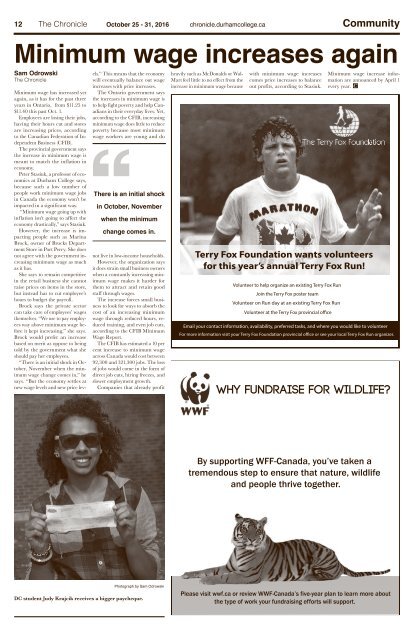Create successful ePaper yourself
Turn your PDF publications into a flip-book with our unique Google optimized e-Paper software.
12 The Chronicle October 25 - 31, 20<strong>16</strong> chronicle.durhamcollege.ca Community<br />
Minimum wage increases again<br />
Sam Odrowski<br />
The Chronicle<br />
Minimum wage has increased yet<br />
again, as it has for the past three<br />
years in Ontario, from $11.25 to<br />
$11.40 this past Oct. 1.<br />
Employees are losing their jobs,<br />
having their hours cut and stores<br />
are increasing prices, according<br />
to the Canadian Federation of Independent<br />
Business (CFIB).<br />
The provincial government says<br />
the increase in minimum wage is<br />
meant to match the inflation in<br />
economy.<br />
Peter Stasiuk, a professor of economics<br />
at Durham College says,<br />
because such a low number of<br />
people work minimum wage jobs<br />
in Canada the economy won’t be<br />
impacted in a significant way.<br />
“Minimum wage going up with<br />
inflation isn’t going to affect the<br />
economy drastically,” says Stasiuk.<br />
However, the increase is impacting<br />
people such as Marina<br />
Brock, owner of Brocks Department<br />
Store in Port Perry. She does<br />
not agree with the government increasing<br />
minimum wage as much<br />
as it has.<br />
She says to remain competitive<br />
in the retail business she cannot<br />
raise prices on items in the store,<br />
but instead has to cut employee’s<br />
hours to budget the payroll.<br />
Brock says the private sector<br />
can take care of employees’ wages<br />
themselves. “We use to pay employees<br />
way above minimum wage before<br />
it kept increasing,” she says.<br />
Brock would prefer an increase<br />
based on merit as oppose to being<br />
told by the government what she<br />
should pay her employees.<br />
“There is an initial shock in October,<br />
November when the minimum<br />
wage change comes in,” he<br />
says. “But the economy settles at<br />
new wage levels and new price levels.”<br />
This means that the economy<br />
will eventually balance out wage<br />
increases with price increases.<br />
The Ontario government says<br />
the increases in minimum wage is<br />
to help fight poverty and help Canadians<br />
in their everyday lives. Yet,<br />
according to the CFIB, increasing<br />
minimum wage does little to reduce<br />
poverty because most minimum<br />
wage workers are young and do<br />
There is an initial shock<br />
in October, November<br />
when the minimum<br />
change comes in.<br />
not live in low-income households.<br />
However, the organization says<br />
it does strain small business owners<br />
when a constantly increasing minimum<br />
wage makes it harder for<br />
them to attract and retain good<br />
staff through wages.<br />
The increase forces small business<br />
to look for ways to absorb the<br />
cost of an increasing minimum<br />
wage through reduced hours, reduced<br />
training, and even job cuts,<br />
according to the CFIB Minimum<br />
Wage Report.<br />
The CFIB has estimated a 10 per<br />
cent increase to minimum wage<br />
across Canada would cost between<br />
92,300 and 321,300 jobs. The loss<br />
of jobs would come in the form of<br />
direct job cuts, hiring freezes, and<br />
slower employment growth.<br />
Companies that already profit<br />
heavily such as McDonalds or Wal-<br />
Mart feel little to no effect from the<br />
increase in minimum wage because<br />
with minimum wage increases<br />
comes price increases to balance<br />
out profits, according to Stasiuk.<br />
Minimum wage increase information<br />
are announced by April 1<br />
every year.<br />
Photograph by Sam Odrowski<br />
DC student Judy Krajcik receives a bigger paycheque.


















